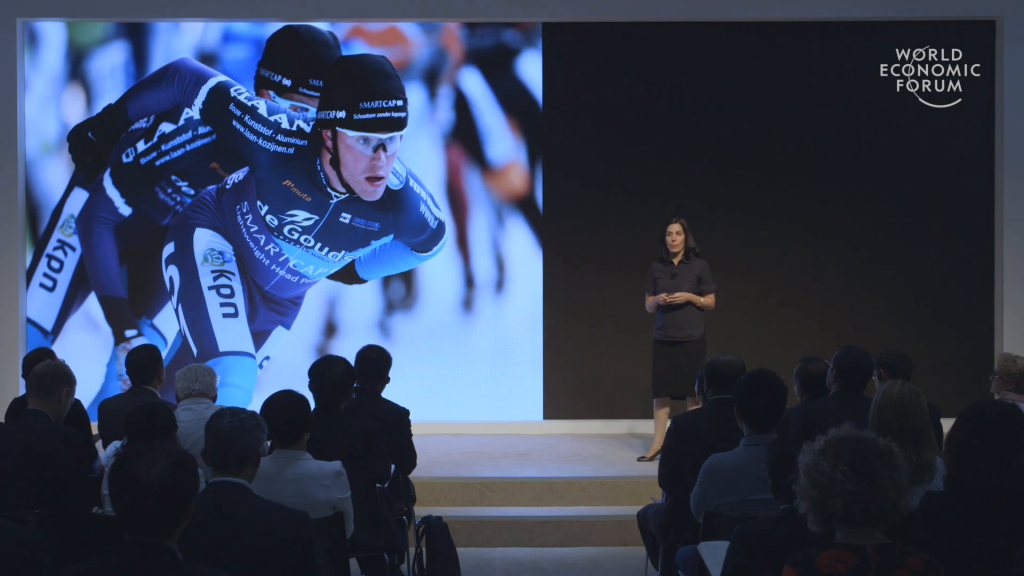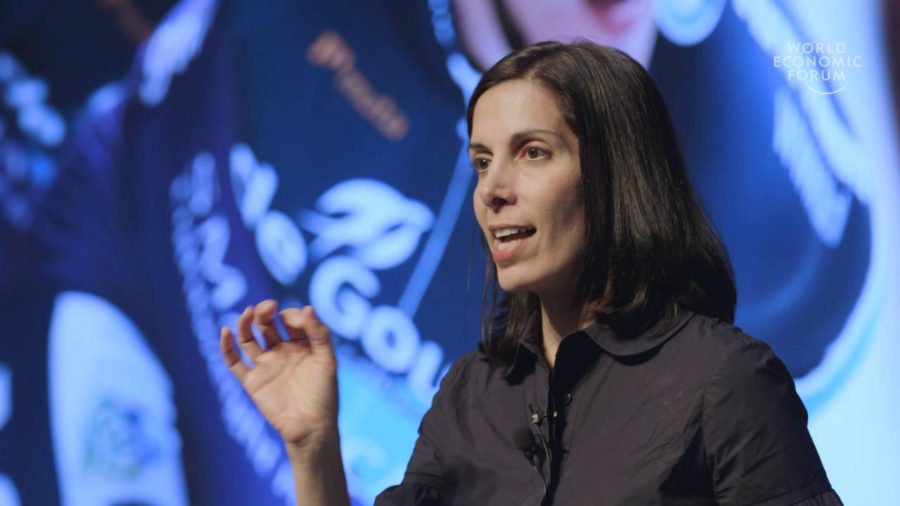I’m here to ask the question and to encourage you to ask the question, are there any limits to the connected workplace? Are there any concerns about the connected workplace? Is there any way in which you wouldn’t want either yourself or an employee to be connected? Are there any limits to the kinds of information we can gather in order to make our workforces more productive? In order to make our overall society more productive?
How many of you wear a wearable device? Like an Apple watch, a Fitbit, anything else? A few of you. How many of you at some point in time have tried one? So, those numbers are growing quite a bit. If you ask a group that is younger—no offense to all of you—the numbers would be even higher. Because people are starting to be far more connected. They’re far more comfortable sharing information about themselves to corporations in order to learn more about themselves.
The revolution in consumer healthcare is upon us already, where people want to know more about themselves, they want to learn more. But for now, most of that information is information they believe that they have control over. That they’re choosing willingly to share. That they’re deciding how much and when to share, or at the very least that it’s anonymized information that can’t necessarily be used against them.
But already, that isn’t necessarily true in the way some of these technologies are being used in the workforce. Some of you may be familiar with Tesco. Tesco has a number of different corporations. The one we’re going to talk about is in their grocery warehousing in Ireland, where they use simple armbands that they implemented in 2013 in order to improve workforce productivity.
The armbands tracked movement throughout the warehouse such that they could tell when an employee picked up something from one place, moved it to another place, for purposes of fulfilling in order. The wonderful thing about this was the employees no longer needed to log the products that they were picking up and moving. They were being automatically logged for them, which increased the efficiency and the time with which they could do so. It allowed better tracking of inventory. It was done on an individual basis—it’s still done on an individual basis—and it allowed them to take time for coffee breaks, for biological breaks. But if they took an unscheduled break, it would be counted against their productivity. And their individual productivity was measured, and their individual productivity was the basis for determining their compensation and their overall advancements.
There was an uproar by the employees. They felt like this was Big Brother watching them. And they really didn’t like it, even though in many ways it did make their jobs easier. They didn’t have to carry the clipboard around anymore. They didn’t have to mark everything from place to place. But they didn’t like the sense in which even their bathroom breaks were being tracked. Well too bad, you might think. They shouldn’t be taking unscheduled breaks. It’s better for workforce productivity, but is it better for morale? Is it better for individuals to feel as if their every movement is scrutinized? Does it improve our experience in the workplace? Does it improve our experience as a society?
Well, why not just quit and go work somewhere else? Why work at Tesco? Well, it turns out a lot of the people who are working in somewhere like a warehouse don’t have terrific job mobility. And once it becomes a more ubiquitous practice, to what extent do they have the option to be able to say, “I no longer wish to work here. I’m going to go work somewhere else instead?”

What you see here is something called a SmartCap. The SmartCap goes to the next level of measuring what individuals are doing with respect to productivity in that it measures the firing of neurons in your brain, and the tiny electrical discharges that occur as a result of those firings. The firing of electrons in your brain happen in patterns based on different emotive states that you might experience, different cognitive states, or for example the state of being alert and awake, or being asleep. Even microsleep is something that we may be able to capture via EEG. And SmartCaps are able to detect not only motor activity, but these different emotive states. And already sports teams are starting to use them to be able to track individual performance, and to be able to enhance individual performance so much that the baseball team analogy that you heard earlier— This is something that’s already being used.
But of course it isn’t just being used by sports teams. It has tremendous potential, and already has been shown to substantially reduce the cost of accidents. One of the leading cause of accidents in the world is drowsy, not drunk, driving. And surely you want individuals who are drowsy while driving to be alerted to that. To be woken up to, be given a message. And we already have lots of technology that’s integrated. For example, Mercedes has Driver Assistance. If you start to veer off the road a little bit, if you start to make little micro changes in the way that you’re using your steering wheel, you are alerted to that fact.
And so how is that different? Well, part of the way it’s different is that your brain was sacred. It was the last and final frontier. I can’t tell what you’re thinking other than to guess by looking at your faces right now, but soon, with these types of devices, these EEG SmartCap devices that have many applications beyond mere drowsiness, we can start to track things like whether you’re drowsy or alert. Which times of day you’re most productive. When you’re paying attention, and when you’re not. What you’re focusing on on the screen when you’re focusing. Whether or not you’re starting to suffer from cognitive decline. Whether you have signs of early dementia. Whether or not you’re starting to become a very expensive person to employ at a company.
And there’s nothing that protects you, in any country, against this type of information being used against you by an employer. In the United States we have something called the Genetic Information Nondiscrimination Act, which protects individuals from having their employers collect their genetic information and use that information against them. There is no Neurological Information Nondiscrimination Act or its equivalent, in the United States or in any other country. And yet your brain holds so much greater potential for being able to learn things about you.
There is no such thing as cognitive liberty. There is no such thing as a truly protected freedom of thought. But maybe there should be. Because these devices are already in the workplace, and we might fear, up until now, that the primary tools of our oppression might be governments, but what if it ultimately is in the workplace? What if the last bastion of freedom, your brain, is no longer so free after all? What if what we’re really talking about is the total end of privacy?
Well, you’ll say, “Privacy is gone already. It’s alright.” But wasn’t your brain the one area in which you thought you would always have some sense of privacy? And companies will say they will not see your data, they’ll aggregate it. And yet already we see that rather than just having something like “people analytics” that looks at how people interact with each other, we’re looking at how individual employees perform. And that has great promise. It’s terrific to be able to find the weakest link. That has great promise that with the right boundaries can help us have more effective workplaces, but also ones with cultures that we want to embrace.
Is it only that we’re going to look at what’s happening? Could we also encourage individuals to start doing things like enhance their brains? Could we ask them to take things like smart pills and smart medications? If you’re drowsy while driving, should you take something like Modafinil in order to improve your wakefulness? If you’re on a 48-hour shift as a physician, should you take a wakefulness drug, and is your failure to do so negligence? We already see on Wall Street that there is rampant use of drugs. We see it across law firms across the world. We see it at the highest performance levels. Is it something your employer can ask you to do?
Ultimately this is a question not just about the productivity of our workforce, but about the culture of our workforce and our society. We have to ask if there are any limits. Are there any regulations? Are there any norms that we wish to adopt to ensure that these great promises in the future, these great promises that are at our doorstep and in our companies today—, if there are any limits that we wish to place to ensure that there’s a balance between maximizing productivity and ensuring that it’s a society and a culture that we want to live in. Thank you.
Further Reference
Annual Meeting of the New Champions 2016 at the World Economic Forum site
